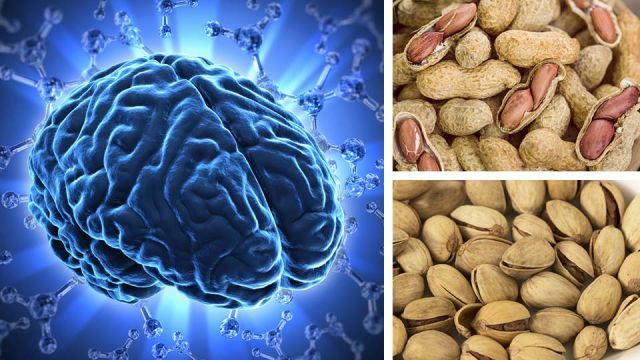
Does forgetting birthdays, anniversaries or where you’ve placed your car keys drive you to drink? Maybe you should try a handful of nuts instead. Do you want to sleep better, be more mindful or retain information better? Well, it turns out eating nuts can help that too.
Research tells us that nuts help reduce the risk factors for many chronic diseases, including heart disease and diabetes. But now science is learning that eating nuts may also be good for your brain. Here’s why you need to include nuts in your diet.
Brain-boosting pistachios and peanuts
Are you eating enough nuts? You should be. It turns out eating nuts such as pistachios, peanuts and walnuts, daily, may improve key brain functions, according to a study from Loma Linda University and published in the Journal FASEB. Researchers found that consuming nuts stimulated several brain frequencies associated with deep meditation, empathy, healing, sleep, cognitive processing, recall and memory. But some nuts stimulated brain frequencies more than others.
For instance, pistachios produced the greatest gamma wave response, which is critical for enhancing cognitive processing, retaining information, learning, perception and rapid eye movement during sleep. Peanuts, which aren’t actually a nut, but rather a legume, were also studied. They were found to produce the highest delta response, which is associated with healthy immunity, natural healing and deep sleep.
Almonds and hazelnuts for an aging brain
Almonds and Hazelnuts are both highly concentrated sources of vitamin E. Research published in JAMA Neurology reported that a higher intake of total vitamin E from foods (and supplements) was associated with less cognitive decline with age. One-quarter cup of almonds or hazelnuts provides nearly 50 percent of the RDA for vitamin E.
Walnuts top the list for baby’s brain health
Walnuts are one of the best nuts for brain health, says BrainHQ. They’re super concentrated in Docosahexaenoic acid (DHA). DHA is a type of omega-3 fatty acid. It’s been shown to protect brain health in newborns and improve cognitive performance in adults. It also helps prevent age-related cognitive decline. What’s particularly interesting is that mothers who get enough DHA in their diet have smarter kids according to a systematic review of studies.
Breast milk contains DHA in various concentration, depending on how much is in the mother’s diet. During pregnancy and the first few years of life, DHA accumulates in the brain and retina of the eye. This plays an important role in brain and vision development. According to studies from the 1990s, formula-fed infants had lower levels of brain DHA than breast-fed infants reports the New York Times.
This suggested that adding DHA to formula might improve cognitive and vision development. The results were so convincing that in 2002, the FDA approved adding DHA into infant formulas. Just a quarter cup of walnuts can provide nearly 100 percent of the recommended daily intake of DHA.
Here are more reasons to include nuts in your daily diet:
Eat nuts for a longer life
A mega-study that looked at over 100,000 people found that eating a variety of nuts may help you live longer. A Harvard study, published in the New England Journal of Medicine, examined the nut consumption habits and death rates of over 75,000 women and over 42,000 men.
Interestingly, those who regularly ate nuts were found to be less likely to die from diseases like cancer, respiratory failure or heart disease, according to the study. In fact, people who ate nuts daily had a 20 percent lower death rate than those who didn’t eat nuts.
Eat nuts for a healthier heart
Nut consumption may also lower your risk for heart disease. A collaboration of five large studies found that nuts, high in monounsaturated fats, have the same health-promoting fats as that found in olive oil.
Most prevalent fats found in nuts are mono and polyunsaturated fats. These fats are unique in that they lower your LDL or low-density lipoprotein cholesterol level. That’s the bad cholesterol that puts your heart at risk. According to the study, one ounce of nuts (about 20 whole nuts) can reduce coronary heart disease risk by 30 percent. Researchers found an even greater risk reduction — 45 percent — when fat from nuts was substituted for the saturated fats normally found in meat and dairy.
Snacking on nuts daily is a great idea. For a little variety add nuts to your salads and cereal. Sprinkle nuts on soup, oatmeal and yogurt. Add nuts to your pasta, popcorn, trail mix, pancakes and steamed veggies. Make it routine. Your brain and your body will thank you.
— Katherine Marko

